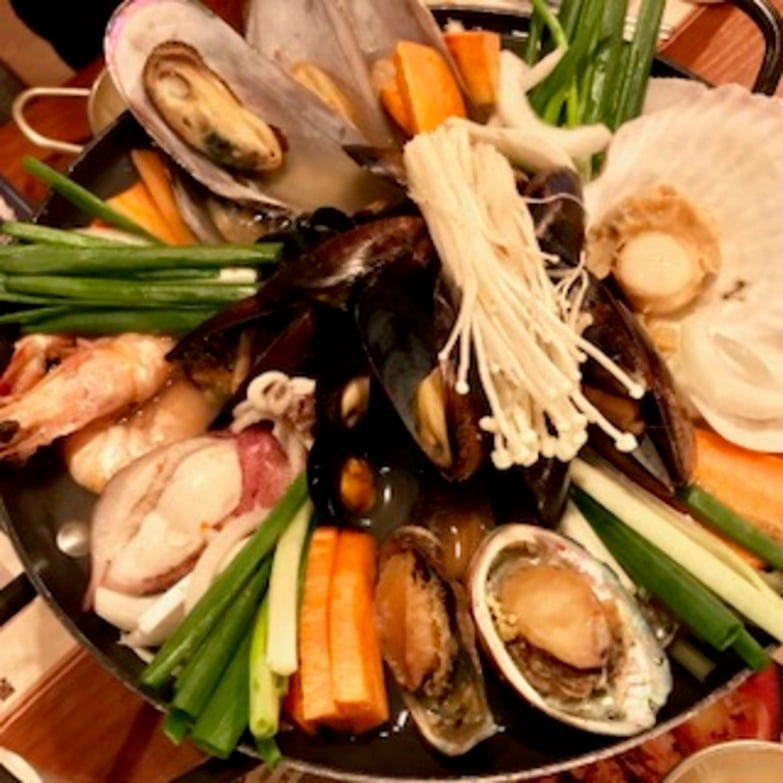There is a moment when Hong Kong experiences a nine-degree cold spell and everybody enters a frenzy of craving hotpot, barbecue and anything spicy. Restaurants are full by 8pm, especially in HK’s mini Koreatown in TST. The smell of any hearty dish lures small groups wandering the streets to come in from the cold. Ssal Bori Ssal’s popularity has picked up since its soft opening earlier last year. The tables are filled with kettles of makgeolli, bubbling stone-pot soups and meat and pancake dishes.
Read more: New Restaurant Review: Ssal Bori Ssal
The restaurant has decided to kick off the Chinese and Korean New Year by adding five new dishes to its menu and introducing new categories of makgeolli, split into fresh and longer-lasting flavours.
The food


Since Chinese and Korean New Year falls on the first day of the lunar calendar, dinner was commenced with a complimentary rice cake pancake sprinkled with sugar and garnished with red date, followed by a pancake platter ($198). The large basket contained a variety of green pepper, burdock root, chive, mung bean, kimchi and shrimp pancakes served with a salty pickled-vegetable sauce, perfect for sharing amongst the table.

The appetisers followed, with the jump seafood soup ($440) hitting the table first. Great for this exceptionally chilly winter, the seafood soup, bursting with abalone, shrimp, mussels, squid, clams and beef, is one of the most popular dishes at Ssal Bori Ssal. Every sip of this full-bodied, sizzling soup is spicy with a complementary, slightly sweet aftertaste. Advance warning: the broth may be too spicy for you to handle if you’re not a fan of chilli paste.

The samgye fried chicken ($227), on the other hand, was a universal favourite. The dish is inspired by Korean fried chicken and traditional chicken ginseng soup. Using the classic ingredients of sticky rice, garlic and large pieces of ginseng, the chicken was slow-cooked for six hours and then fried to give a golden crust. The result? Tender, juicy chicken with thin, perfectly crispy skin.

We were also treated to a taste of the spicy pork stew ($230). A signature dish of Incheon, the large ribs were soaked in cold water for an hour, then boiled with onion, whole pepper, garlic and bay leaf. Potatoes were added and the spicy soup was topped with perilla leaves. After the first few tastes, the broth was just as spicy as the seafood soup we had earlier. Unfortunately, we had difficulty eating the pork. Most of us were left with a massive bone, with just tiny teaser pieces remaining. The grassy, aniseed-like perilla garnish complemented the broth, creating a refreshing taste that didn’t overpower the stew.

The triple beef ssam ($420) was another popular dish. Tteok (rice cakes) and kalbi (beef short rib) were served on a hot plate with chives, burdock root pancakes and lettuce, along with a variety of sauces including gochujang, soy sauce and soybean paste – all there as dressing possibilities for DIY wraps. The beef was melt-in-the-mouth tender, but we would have preferred this dish as a group appetiser at the beginning of the meal.
The makgeolli

At the tasting, I was the only person who tried the makgeolli platter ($138). I didn’t mind because a) more for me and b) I love drinking makgeolli. Not only is makgeolli easy to drink, but different bottles with infused flavours can go a long way in complementing chilli-based dishes. While the Boksoondoga makgeolli ($260) remains the eatery’s signature premium, I was excited to see what Ssal Bori Ssal had selected to showcase for the new year. The flavours were divided into fresh and enduring.
Fresh makgeolli lasts for a month and is produced in designated breweries chosen by the government, with the specific criteria that each brewery must have a minimum history of 90 years. The enduring makgeolli has a longer shelf life, with the span of a year.
The premium line also consists of Buja makgeolli ($135). The first bottle was enhanced by purple sweet potato, which was sweet with a cloudy purple colour. The initial sip was dry, leading to a smooth aftertaste of rice and nuruk. The Buja grape makgeolli had a higher alcohol content with a drier taste. Both Buja makgeolli had no carbonation.
My favourite of the evening was the Gongju makgeolli ($138), which was infused with chestnut. While it was the sweetest makgeolli, this one had the most unique flavour with a nutty aftertaste, complementing the spicy pork stew and seafood soup.
Verdict
Ssal Bori Ssal takes its food seriously while maintaining a casual, homey atmosphere. The dishes are distinct, robust and full of flavour. The small eatery has made a big impact within TST’s Koreatown with its menu full of hearty options. The new dishes are heavier, catering to cold-weather dining. All are perfect for sharing amongst friends, family and colleagues. The makgeolli remains a must-order for sipping during your meal, and if you’re feeling indecisive? Go for a tasting of the makgeolli platter.
78 Kimberley Road, TST, 2736 8444
This write-up is based on a complimentary media tasting provided in exchange for an honest review and no monetary compensation. The opinions expressed here represent the author’s.

For more articles like this, like Foodie on Facebook

